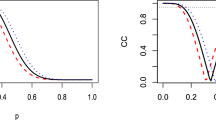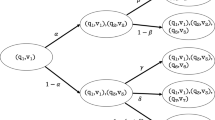Abstract
There are two basic approaches to the problem of induction:the empirical one, which deems that the possibility of induction depends on how theworld was made (and how it works) and the logical one, which considers the formation(and function) of language. The first is closer to being useful for induction, whilethe second is more rigorous and clearer. The purpose of this paper is to create an empiricalapproach to induction that contains the same formal exactitude as the logical approach.This requires: (a) that the empirical conditions for the induction are enunciatedand (b) that the most important results already obtained from inductive logic are againdemonstrated to be valid. Here we will be dealing only with induction by elimination,namely the analysis of the experimental confutation of a theory. The result will bea rule of refutation that takes into consideration all of the empirical aspect of theexperiment and has each of the asymptotic properties which inductive logic has shown tobe characteristic of induction.
Similar content being viewed by others
REFERENCES
Agazzi, E.: 1988, Probability in the Sciences, Kluwer Academic Publishers, Dordrecht.
Ash, R. B.: 1965, Information Theory, Dover, New York.
Bar-Hillel, Y. and R. Carnap: 1953, ‘Semantic Information’, British Journal for the Philosophy of Science 4, 144–167.
Bar-Hillel, Y.: 1965, Logic, Methodology and Philosophy of Science, North Holland, Amsterdam.
Breiman, L.: 1957, ‘The Individual Ergodic Theorem of Information Theory’, Annals of Mathematical Statistics 28, 809–811; 1960, 31, 809–810.
Casartelli, M.: 1988, ‘The Contribution of A. N. Kolmogorov to the Notion of Entropy’, in E. Agazzi (ed.), pp. 149–159.
Cover, T. M. and J. A. Thomas: 1991, Elements of Information Theory, Wiley, New York.
Feinstein, A.: 1954, ‘A New Basic Theorem of Information Theory’, IRE Transaction 9, 2–22.
Greeno, J. G.: 1970, ‘Evaluation of Statistical Hypotheses Using Information Transmitted’, Philosophy of Science 37, 279–294.
Hanna, J. F.: 1969, ‘Explanation, Prediction, Description and Information Theory’, Synthese 20, 308–334.
Hanna, J. F.: 1978, ‘On Transmitted Information as a Measure of Explanatory Power’, Philosophy of Science 45, 531–562.
Hilpinen, R.: 1970, ‘On the Information Provided by Observations’, in J. Hintikka and P. Suppes (eds.), pp. 97–122.
Hintikka, J.: 1965, ‘Towards a Theory of Inductive Generalization’, in Y. Bar-Hillel (ed.), pp. 274–288.
Hintikka, J.: 1966, ‘Acceptance and Inductive Logic’, in J. Hintikka (ed.), Suppes, pp. 1–20.
Hintikka, J. 1968, ‘The Varieties of Information and Scientific Explanation’, in B. Van Rootselaar (ed.), pp. 311–331.
Hintikka, J.: 1970, ‘On Semantic Information’, in J. Hintikka and P. Suppes (eds.), pp. 3–27.
Hintikka, J. and J. Pietarinen: 1966, ‘Semantic Information and Inductive Logic’, in J. Hintikka and P. Suppes (eds.), pp. 96–112.
Hintikka, J. and P. Suppes: 1966, Aspects of Inductive Logic, North Holland, Amsterdam.
Hintikka, J. and P. Suppes: 1970, Information and Inference, Reidel, Dordrecht.
Jamison, D.: 1970, ‘Bayesian Information Usage’, in J. Hintikka (ed.), Suppes, pp. 28–57.
Khinchin, A. I.: 1953, ‘The Entropy Concept in Probability Theory’, Uspekhi matematicheskikh nauk 3(3),3–20; English translation in Khinchin (1957), pp. 1–28.
Khinchin, A. I.: 1956, ‘On the Fundamental Theorems of Information Theory’, Uspekhi matematicheskikh nauk 11(1),17–75; English translation in Khinchin (1957), pp. 30–120.
Khinchin, A. I.: 1957, Mathematical Foundations of Information Theory, Dover, New York.
Kyburg, H. E.: 1970, Probability and Inductive Logic, McMillan Company, London.
Kolmogorov, A. N.: 1958, ‘New Metric Invariants of Transitive Dynamical Systems and Automorphisms of Lebesgue Spaces’, Doklady Akademii Nauk SSSR 119, 861–864.
Levi, I.: 1983, The Enterprise of Knowledge, MIT Press, Cambridge.
McMillan, B.: 1953, ‘The Basic Theorems of Information Theory’, Annals of Mathematical Statistics 24, 196–219.
Petersen, K.: 1983, Ergodic Theory, Cambridge University Press, Cambridge.
Rosenkrantz, R.: 1970, ‘Experimentation as Communication with Nature’, in J. Hintikka and P. Suppes (eds.), pp. 58–93.
Shannon, C. E.: 1948, ‘The Mathematical Theory of Communication’, Bell Systems Technology Journal 27, 379–423, 623–656; reprinted in C. E. Shannon and W. Weaver (1963), pp. 29–125.
Shannon, C. E. and W. Weaver: 1963, The Mathematical Theory of Communication, University of Illinois Press, Chicago.
Van Rootselaar, B. and J. F. Staal: 1968, Logic, Methodology and Philosophy of Science, North Holland, Amsterdam.
Weaver, W.:1963, ‘Recent Contributions to the Mathematical Theory of Communication’, in C. E. Shannon and W. Weaver (eds.), pp. 3–28.
Author information
Authors and Affiliations
Rights and permissions
About this article
Cite this article
Badino, M. An Application of Information Theory to the Problem of the Scientific Experiment. Synthese 140, 355–389 (2004). https://doi.org/10.1023/B:SYNT.0000031325.69601.af
Issue Date:
DOI: https://doi.org/10.1023/B:SYNT.0000031325.69601.af




